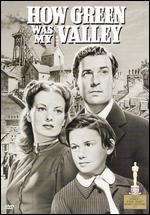How Green Was My Valley
Reviewed by: Brett Willis
STAFF WRITER
| Moral Rating: | Good |
| Moviemaking Quality: |
|
| Primary Audience: | Family |
| Genre: | Historical, Drama |
| Length: | 2 hr. 5 min. |
| Year of Release: | 1941 |
| USA Release: |
| Featuring | Walter Pidgeon, Maureen O'Hara, Roddy McDowall, Donald Crisp, Sara Allgood, Anna Lee, Barry Fitzgerald |
| Director |
John Ford |
| Producer | Darryl F. Zanuck |
| Distributor |
 20th Century Fox 20th Century Fox
|
Possibly John Ford’s best film and well-deserving of its Best Picture Oscar, this story of life in a late 19th-century Welsh coal mining town is captivating and heartbreaking. It must be seen to be appreciated.
In the opening scene, 50-year-old Huw Morgan (pronounced Hugh) is moving from his childhood valley which is now polluted with mine waste. He then provides the voiceover throughout the remainder of the film, while played as a 10-year-old by Roddy McDowall. Young Huw is a caboose, having six adult siblings—five brothers who (along with his father) all work in the mine, and a sister, Angharad (Maureen O'Hara). Among the issues the film covers: unsafe working conditions, unionization in response to mechanization and wage cuts, child labor, extreme prejudice against “miner kids” by the teacher as well as the students in Huw’s school, and arranged marriage. There are some scenes of violence and some deaths (not murders), which are integral to the story. I should mention that the film features some beautiful male choral singing.
Huw’s parents (Donald Crisp and Sara Allgood) shoulder much hardship throughout the film. Huw’s father is thoroughly respected by his adult sons, but he and they part company on the unionization issue until the chapel’s junior minister, Mr. Gruffydd (Walter Pidgeon), finds them some middle ground. Huw’s mother dares to invade a “men’s meeting” and confront those who are about to make a bad decision; on another occasion, she utters what sounds like a profanity but can’t be made out clearly; on still another, she (like her daughter-in-law before her) seems to lose touch with reality and imagine that lost loved ones are still nearby.
Another issue touched on is the way “sinners” are punished by the chapel that nearly everyone in town attends: through excommunication by the board of deacons, without regard to the rules of evidence (in other words, if people gossip about you, YOU’RE the one who’ll be punished). I’ve known both Calvinist and Arminian churches that were capable of treating people that way; the issue seems to be not so much formal theology as a perception that God is our enemy and is just waiting for us to make a mistake so He can crush us. Those who hold that view would naturally think they’re carrying out God’s will when they mistreat each other. As Mr. Gruffydd says in his last chapel address before leaving the valley, such people have no idea what the sacrifice of Jesus is all about. God wants Christians to succeed, not fail; and he’s made provision for their success (Ezek. 18:23; Philippians 1:6; 2 Tim. 1:12; 2 Peter 1:2-4).
Despite its sadness, the theme of strong family relationships makes this film very worthwhile. It will also remind us to be thankful that we live in a later time.



My Ratings: [Excellent! / 5]